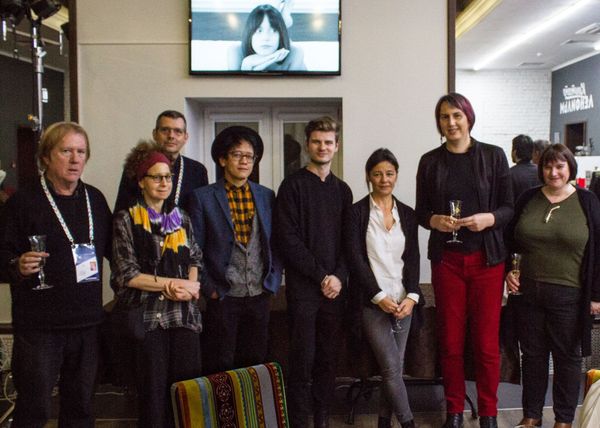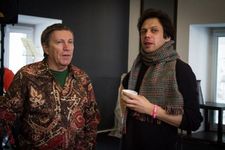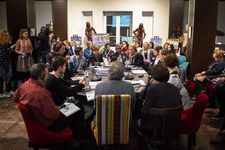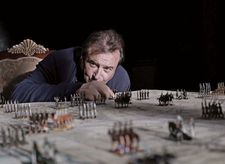 |
| L to R: Godfrey Cheshire, Alyssa Simon, Yair Raveh, Leo Soesanto, Hugo Emmerzael, Senem Erdine, Cerise Howard, Amber Wilkinson
Photo: Denis Ishtokin |
While I might not subscribe to the idea that "context is everything", it can make an enormous difference. In its simplest terms, what portion of fish and chips isn’t elevated by eating it with the scent of sea air in your nostrils and the sight of waves crashing on a beach? And, when it comes to film, there’s no doubt that background knowledge you bring to the cinema can add to the experience.
The odd thing about context, though, is that often you don't notice it has been missing until you feel its presence. Certainly, that's how it was for me, during the First FIPRESCI Colloquium Dedicated to Russian Cinema, which was held in St Petersburg at Lenfilm Studio from November 13-15, immediately before the city's Cultural Forum, encompassing all the arts and featuring a speech by no less a body than President Vladimir Putin himself.
I'm lucky enough to travel to a handful of film festivals a year and often come across the odd Russian film along the way - in 2017, for example, Boris Khlebnikov's Arrhythmia, which has deservedly become a staple of the festival circuit, although I've not yet managed to add foreign language Oscar nominee Loveless (something I've now been able to correct since the time of writing this article), directed by Andrey Zvyagintsev, to the list. But while these occasional encounters might feel like a snapshot, it's more akin to a hastily taken photograph that is partially obscured by a thumb over the lens.
It isn't until you sit down and watch a raft of films from the same country of origin - generally speaking, when a festival shines a regional spotlight on them - that you get a more accurate sense of the deeper themes and trends underpinning them. It's also easy to forget that while most national cinema-going is dominated by the mainstream, the films we tend to see at festivals, or in independent cinemas for that matter, are the smaller, independent festival films. While it's great that these stories receive international oxygen, it's worth remembering they are often on the margins domestically as well – and not necessarily representative of the bigger trends moving in the mainstream.
This was one of the many reasons the colloquium proved so valuable. Carefully curated by a team including Russian critic and current FIPRESCI Honorary President Andrei Plakhov and editorial director of the Russian film journal Seance, Konstantin Shavlovsky - both of whom also provided excellent introductions to the films - the programme boasted 12 recent features. It included a day dedicated to independent works and another that shone a spotlight on the Russian mainstream.
 |
| Andrei Plakhov and Konstantin Shavlovsky and their team curated the festival programme Photo: Denis Ishtokin |
Strolling through Lenfilm's ornate sets that had been used for Russian adaptations of Sir Arthur Conan Doyle - The Adventures Of Sherlock Holmes And Dr Watson (take a look at a snippet of one of them here) was a vibrant reminder of the importance of cultural exchange and the way that influences cut back and forth from East to West, unhindered by physical boundaries.
But if the Russian blockbusters we saw carried an echo [‘of’] similar films from the American and British mainstream - with Klim Shipenko's cosmonaut drama Salyut-7 recalling the likes of Apollo 13 and Gravity, Aleksey Uchitel's Matilda sharing some of the DNA of films including Joe Wright's Anna Karenina (that film's source material another reminder of the Russian influence reflected by the West) and Fedor Bondarchuk's Attraction calling to mind the technical craftsmanship of Independence Day - each had a distinctly Russian flavour.
Salyut-7 proved every bit as gripping as its US equivalents, while familiar themes of loyalty and friendship were reinvigorated by the switch of political viewpoint, while Attraction's setting in a suburb of Moscow lent it a distinctive sense of place, further enhanced by Bondarchuk's decision to draw on real-life rioting in the city as inspiration to help the tension mount. Wandering St Petersburg’s enormous Hermitage and Winter Palace in the days that followed watching Matilda made me both more aware of the excellent DoP work and direction involved - who wouldn't want to take in sweeping ceiling shots in rooms so ornate? - but also provided more a greater wealth of background information, courtesy of rather cumbersomely titled exhibition, “The Winter Palace And The Hermitage In 1917. History was made here”, dedicated to discussion of the October Revolution during its centenary.
Seeing Tsar Nicholas II, whose self-conflict and rise to power is the focus of Matilda, from the other end of history, when he abdicated and was killed, along with his family, by the Bolsheviks less than a year later, made the film's themes ring more resonantly. It also helped to explain - although certainly not justify - at least some of the controversy surrounding the film, which has included arson attacks.
 |
| Colloquium roundtable discussed how Russia might enhance its films' profile on the world stage Photo: Denis Ishtokin |
The colloquium roundtable event was held at Lenfilm on the final day of screenings, featuring 14 critics from around the world, including myself, along with a smattering of film students and others, our different geographical and cultural viewpoints adding to the depth of discussion. One of the key points of discussion was how modern Russian film might make more of itself on the world stage. It's true that having some sort of organisation, such as France's mighty Unifrance, to promote the country's output globally would certainly help - as, most definitely, did this colloquium event - but we also discussed how the likes of Matilda show other ways to garner international attention. In Uchitel's case, canny casting has been used, with German star Lars Eidinger and compatriot Luise Wolfram taking leading roles alongside Polish hot property Michalina Olszanska, ensuring interest, at least, from their home territories.
There was also a lively debate about whether critics should be quite so puritanical regarding the avoidance of dubbing. While most film lovers prefer to watch a film with subtitles, persuasive points were made about dubbing - if it was good - offering a potential doorway to new audiences, something that may well be made an increasing possibility by the rise of streaming services such as Netflix, who already employ a squad of freelance subtitlers. But for all the talk of reaching out to make the films more accessible linguistically, we were pretty much all agreed that one of their chief selling points is a strong sense of place. As has already been noted, this was apparent with the mainstream movies, but it was even more noticeable in the independent offerings.
A sense of the enormity of the country was given by Alexander Hant's How Viktor "The Garlic" Took Alexey "The Stud" To The Nursing Home, an enjoyably acidic comedy in the Danny Boyle/Guy Ritchie vein, that sees an estranged father and son take a road trip through some of it. The nation's vastly different regional landscapes also came to the fore in Kostas Marsan's My Murderer, which saw its detective travel to the Yakutia region of Siberia. Here, where the sun barely seems to set in the summer, there was also a sense of the East, Asia, meeting the West, Europe. Marsan puts both the diverse natural landscapes and Yakutian language to excellent use, bringing an area of Russia to the screen that might well surprise audiences at home as well as abroad. Also stretching out beyond the usual city environs of Moscow and St Petersburg, was Kantemir Balagov's Closeness, which is set in the Kabardino-Balkaria Republic in North Caucasus. This tense family drama proved to be not only a gripping character study but also an impressive evocation of boththe place and a time, just before the Second Chechen War.
 |
| Aleksey Uchitel on the set of Matilda Photo: Courtesy of Kinostar Films |
The final film in the programme and, sadly, the only one directed by a woman, was The Bird. If it was disappointing that more female directors weren't included, the feeling was compounded by the odd stereotyping of women used in Kseniya Baskakova's film, which despite having a welcomingly feisty young girl at its heart, took a leaf out of the Benny Hill playbook when it came to the secondary female characters.
The Cultural Forum itself brought additional film gems, including special effects artists Richard Taylor and Oleg Berezin discussing what the future might hold for cinema - less a discussion of CGI onscreen than of the way that audiences’ consumption of media is changing and being met by technological advances - plus a small but impressively curated exhibition dedicated to animator Fyodor Khitruk, beloved in Russia for his re-imagining of Winnie the Pooh (as a panda), although perhaps better known abroad for his short Film Film Film (watch it here.)
A few of us also went along to a photo exhibition celebrating the work of Andrei Tarkovsky, although there was much discussion through the week of the length of the Russian great's shadow. That, in itself, offers food for thought for those of us outside Russia. While it's important for the country to showcase itself and give foreigners as much opportunity to see new films as possible, it's also important for those of us looking in from the outside to be aware of our own short-sightedness. The event was a reminder that we should take every opportunity to see beyond the films of historic darlings such as Tarkovsky and Sergei Eisenstein to the new kids in the Bloc – considering them in more modern contexts rather than taking any opportunity, however tenuous, to compare them to past masters.
Related articles:
- Highlights of Russian Film Week
- Making Matilda
- Creating Closeness
- Making a box office Attraction





















